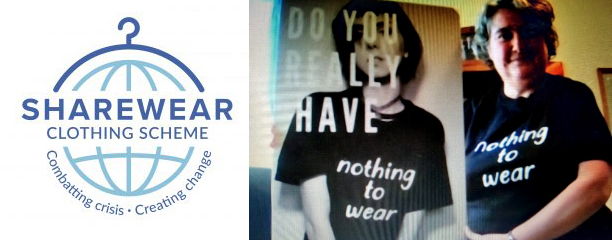Who Will Champion the Rights of Those in Clothing Poverty?
by Louise Cooke. Founder, CEO and Head of Operations Sharewear Clothing Scheme

In 2018 Sharewear Clothing Scheme launched Clothing Poverty Awareness Day (9th June) to highlight the hidden issue of clothing poverty in the general population. Today the charity holds a Clothing Poverty Awareness Week to continue the conversation about this under-reported issue. This year’s #CPAW2021 runs from the 7-13th June and Louise Cooke, Founder, CEO and Head of Operations, writes a blog asking us all to consider the everyday impact of clothing poverty.
It’s a devastating fact that for the 14 million people living in poverty in the UK, access to clothing for themselves and their families is as far beyond their reach as the affordability of food, hygiene and period products, and the cost of heating are.
Sharewear Clothing Scheme began as an ‘experiment’ back in 2014 in Nottingham after my son had seen the desperate need for free clothing provision in his weekly volunteering session at a foodbank. The idea was to provide free clothing of all types, for people aged ‘newborn to ninety’ in an organised and dignified way using a referral system. Fast forward seven years, and the tiny team of four volunteers in a room at the back of a church has grown to a team of over forty volunteers and three employees across three referral centres, in Nottingham, Sheffield and Sutton-in-Ashfield, from where we serve people in seven counties. Through collaboration with other organisations, we now also provide clothing to those in poverty in North London.
Clothing poverty remains THE undisclosed and undocumented aspect of deprivation and economic insecurity in the UK today. Lack of affordability of appropriate clothing affects every aspect of life from the mundane every-day ‘functioning’ that we all take for granted to the once-in-a-lifetime highs and lows. It keeps people trapped in the unjust situations they find themselves in. Not only does it prevent them from functioning in life, but it also means they are unlikely to ever actually flourish in life or reach their full potential. When individual members of a community don’t reach their full potential, then the community as a whole doesn’t. And when local grassroots communities aren’t flourishing then Society as a whole can’t. Clothing Poverty perpetuates a dumbed-down and socially unjust version of Britain – a Britain that will continue to be run by an army of volunteers trying to help people keep their heads above water.
But, when was the last time you heard someone talking about this gross economic injustice or saw it in the news? We aren’t talking about just school uniform in August ready for September here; or warm clothes in January for rough sleepers; or baby essentials for struggling new mums, or interview clothes to get back into work. These are the things that come to people’s minds if you ask them about clothing poverty. It’s these and so very much more! As I write these words, in the last week alone our centres have seen people who have no access to clothing to bear a coffin at their mum’s funeral; whose two children aren’t allowed outside at their nursery without sun hats; whose three sons can’t learn to swim at school with no bathers; who have no fitting clothes after gaining lots of weight from medication; who arrived in their new city with the clothes on their back after fleeing domestic violence, as well as the hundreds of older people we support in hospital each month who have no support network to bring them decent day clothes for rehabilitation and recovery and who are being discharged in hospital gowns. Who in the public eye speaks out for these people? No-one.
Some of these situations involve everyday aspects of possessing clothes which we take for granted. Others are major, once-in-a lifetime events. What they have in common is that this injustice is being suffered in silence, due partly to the historic stigma that still pervades not having decent clothes. And to make matters worse, we hear stories from people who haven’t been accessing other poverty alleviation services or participating in vital parts of life that will help lift them and their family out of poverty precisely BECAUSE they didn’t have a clean set of clothes to put on to attend. Imagine only having one change of clothing and not having funds to fix your broken washing machine. Imagine having only one change of underwear. Would YOU leave the house to get food from the foodbank; attend your debt advice session; take your kids to school, or go to the Advice Centre? So where is the public outcry? There isn’t one.
A simple blog can never fully describe how these and other situations are caused by the knock on effects of clothing poverty. (And the connection to poor mental health and general wellbeing must be the subject of a separate blog of its own!) Yet, just from my brief outline here, it’s easy to see how the different tendrils of clothing poverty trap people in persistent poverty in a never-ending cycle. So, I ask the question: Who will champion the rights of those in clothing poverty?
It took a pandemic and a high-profile footballer to truly put the issue of child hunger on the map. It seems that the incredible service from foodbank volunteers over the last decade wasn’t enough to have already done that in such a way that the government would sit up and take notice. Why not? Whatever the answer to that question, those of us involved in clothing poverty alleviation and awareness-raising, as well as the millions who are experiencing it, are still waiting for our Marcus Rashford. Maybe then we can get the issue of clothing poverty trapping people in economic injustice, at the same time as 300,000 tonnes of clothing going to landfill each year, TRULY on the national agenda. Let’s hope so.




